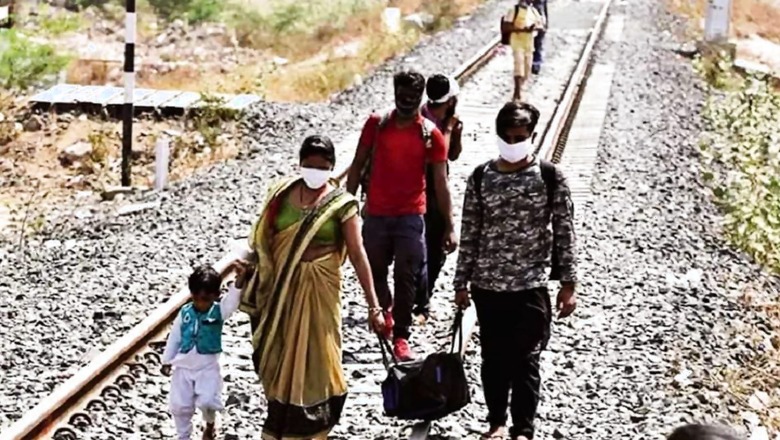
views
A Parliamentary panel has asked the labour ministry to take note of any unprecedent situation, like the migrant workers' exodus during the pandemic, rather than waiting for the judiciary to intervene on the issue. "Committee…exhort the Ministry to take suo-moto cognizance of such unprecedented crisis without waiting for the judiciary to intervene and leverage their monitoring and coordination mechanism with the State/UT Governments to effectively implement the advisories/guidelines issued at the Central level…. "…to ensure statutory compliance by all the stakeholders for providing the much needed help to the migrant workers and empower them to deal with the pandemic," stated the Parliamentary Standing Committee on Labour in its 25th report tabled in Parliament on Tuesday.
The panel noted that total number of migrant workers who returned to their home states during the lockdown in the first wave of COVID-19 was 1,14,30,968 During the second wave lockdown, 5,15,363 migrant workers returned to their home states. It found that in compliance to a Supreme Court order on June 9, 2020, Union Labour Secretary wrote a letter on June 19, 2020 to the chief secretaries/ administrators of all states/UTs to collect and maintain details of all migrant labours who returned to their native places alongwith their skill, nature of employment etc to facilitate the administration to extend benefit of different schemes to them.
It also noted that regular review and coordination meetings of the ministry are being held with states/UTs with a view to ensuring food security, health safety and transport facilities to the migrant workers. "When the entire nation was witnessing a heart-rending sight of lakhs of migrant workers walking back to their native places helplessly without anything to fall back on, the Committee find it surprising that the Ministry waited for as long as two months i.e. until June 2020 to write to the State Governments and that too after goaded by the Supreme Court, to collect the much needed detailed data of the migrant workers," the report stated.
It speaks volumes of the inaction/delayed action on the part of the ministry at that specific point of the crisis, notwithstanding a number of appreciable and pro-active measures undertaken by the central and state governments subsequently to provide food, shelter, transport and health facilities to the migrant workers, the panel stated in the report. The consequential effects of loss of jobs, rising unemployment and indebtedness of unorganised workers and their family members have the potential to cast a long shadow and irreparable damage, it noted.
The committee further said the government both at the central and state levels should encourage and introduce entrepreneurial opportunities as means of sustenance which would help in reducing unemployment and supporting recovery. Further, it suggested that in order to enhance the skills/expertise of the vulnerable and marginalised population, focussed attention should be paid towards creating a large number of skill development programmes which would ensure availability of quality manpower to cater to the needs of the economy.
It opined that leveraging investments into traditional sectors, strengthening the Make in India mission and intensifying further infusion of technology into various sectors would certainly provide enhanced local and pan-India employment opportunities. Noting that the COVID crisis in India has come in the backdrop of pre-existing high and rising unemployment, it said a comprehensive roadmap is required to address the deteriorating condition of employment and widening disparities in the job market in the organised Sector.
Offering another round of income support to the poor to compensate for loss of jobs would go a long way in mitigating their woes, it added. Further, fund allocation to ramp up health infrastructure should be increased and universal health care for all should be made a legal obligation of the government.
International coordination on stimulus packages and debt relief measures especially for MSMEs will prove to be very critical to the multi-pronged approach towards effective and sustainable recovery, it pointed out. It also asked the ministry to take up the matter with the Ministry of Statistics and Programme Implementation for timely completion of surveys, besides taking into cognisance the research carried out by other credible institutions so that requisite corrective action can be taken to address rising unemployment due to the pandemic.
It found that four states — Delhi, Chhattisgarh, Assam and West Bengal — are yet to integrate with the ONORC (One Nation One Ration Card) plan. In view of the crucial role played by ONORC during the pandemic, it urged the ministry to take up the matter with the four states.
Also, a performance assessment of the 32 states/UTs which have already been enrolled under the ONORC should be carried out, it stated. The report also pitched for mandatory health insurance for all MGNREGA workers by suitably amending the payment schedule.
There is an imperative need for putting in place an Employment Guarantee Programme for the urban workforce in line with MGNREGA, it added.
Read all the Latest News, Breaking News and Assembly Elections updates here.




















Comments
0 comment